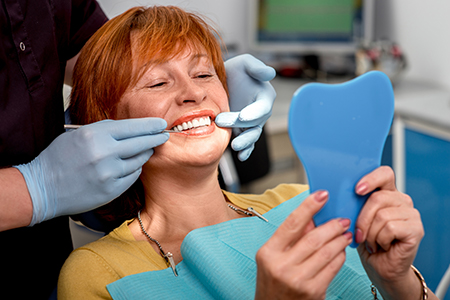Advances in dental materials and digital techniques have changed how we restore missing teeth. Removable dentures remain a dependable option for many people, offering a practical way to reestablish chewing, speech, and a confident smile when fixed solutions aren’t the right fit. Today’s dentures are lighter, more lifelike, and engineered to work with each patient’s anatomy rather than simply covering it.
Our approach balances modern science with attention to individual needs. We design each denture to complement facial contours, preserve remaining oral structures where possible, and make day-to-day life easier for the wearer. With thoughtful planning and precise laboratory work, a well-made denture can be both comfortable and attractive.
When suitable, dental implants and fixed bridgework can provide alternative long-term solutions; however, removable partial and complete dentures continue to be a versatile, non-invasive option for restoring a healthy, functional mouth. Chroma Dental works with patients to evaluate the best restorative path for their oral health and lifestyle.
Losing teeth affects more than appearance. Gaps in the dental arch change how the jaw functions, alter chewing patterns, and can lead to uneven wear on remaining teeth. Over time these mechanical shifts may contribute to digestion problems and a reduced ability to enjoy a wide variety of foods, which in turn can affect overall nutrition and well-being.
Beyond mechanics, missing teeth influence facial support. Tooth roots and the stimulation they provide help maintain bone volume; without them the jawbone gradually remodels, which can cause the lower face to appear shorter or collapsed. Dentures help replace that support and slow the visible changes in facial contours, improving the balance between teeth, lips, and cheeks.
There are social and emotional aspects as well. Difficulty speaking clearly or reluctance to smile can impact confidence and daily interactions. Replacing missing teeth—whether with a partial, a full denture, or another restorative option—often restores essential function and makes social participation more comfortable.

A denture is an oral appliance that substitutes for natural teeth and the soft tissues that support them. Modern dentures pair realistic artificial teeth with a carefully contoured base that sits against the gums. Materials have evolved to provide durable, stain-resistant teeth and bases that mimic the subtle translucency and texture of natural oral tissues.
One of the practical advantages of a removable denture is maintenance: the prosthesis can be taken out for daily cleaning and overnight soaking, which helps protect gum health and any remaining natural teeth. Proper hygiene and occasional professional checks are essential to keep both the denture and the underlying tissues in good condition.
Although dentures don’t replicate every function of natural teeth, a well-made prosthesis restores much of the ability to bite, chew, and speak clearly. With an appropriate design tailored to each mouth, many patients return to familiar foods and experience a significant improvement in comfort and confidence.
Selecting the right type of denture depends on how many teeth are missing, the condition of the remaining teeth and gums, and the patient’s goals. A thoughtful clinical evaluation considers the bite relationship, the ridge anatomy, and the health of supporting tissues to recommend a solution that balances stability, ease of care, and aesthetics.
Full dentures replace all teeth in one or both arches. Their design focuses on even tissue contact and balanced occlusion to distribute chewing forces and maintain comfort. When crafted carefully, modern full dentures can offer reliable function and a natural appearance that supports the lips and cheeks.
Immediate dentures are inserted at the time of tooth removal so patients don’t go without teeth during healing. While convenient, they often require subsequent adjustments or relines as gums and bone remodel. In some cases, a conventional denture fitted after healing may provide a more stable long-term fit.
Overdentures
An overdenture gains additional retention by fitting over remaining tooth roots or attachments on implants. This approach preserves alveolar bone and increases stability compared with conventional full dentures, improving chewing efficiency and patient comfort.
Implant-Supported Dentures
Implant attachments provide fixed anchor points that greatly improve retention and reduce movement during function. While still removable by the patient in many designs, implant-supported prostheses often feel more secure and can restore a wider range of foods to the diet.
Partial dentures replace one or several missing teeth and use clasps, precision attachments, or discreet connectors to integrate with existing teeth. Besides restoring appearance and chewing ability, partials protect the remaining dentition by preventing unwanted shifting and helping maintain a stable bite.
Material options for partial frameworks now include lightweight metals, flexible resins, and hybrid combinations that prioritize strength and patient comfort. The right material and attachment system are selected to match the clinical situation and the patient's preferences.

Successful denture care begins long before the prosthesis is delivered. We take a comprehensive approach that examines oral health, jaw relationships, and facial aesthetics to develop a treatment plan. Diagnostic imaging and careful records ensure the laboratory team has the information needed to fabricate a prosthesis that complements your anatomy.
In some cases preparatory work—such as restoring unstable teeth, smoothing bony prominences, or making minor surgical changes—helps create a better foundation for the denture. These pre-prosthetic steps are recommended when they will meaningfully improve fit, comfort, or long-term tissue health.
Communication between clinician, patient, and dental laboratory is critical. Selecting tooth shape, color, and set-up are collaborative decisions that influence how natural the final result looks and feels. Attention to these details leads to a prosthesis that integrates comfortably with speech patterns and facial dynamics.

Adjusting to a new denture is a process. Early visits are focused on refining fit, eliminating sore spots, and improving comfort. Minor adjustments are common as soft tissues adapt to the appliance and as you relearn biting and speaking habits. Patience and regular follow-up help the transition go smoothly.
You may notice temporary changes such as increased saliva, slight speech differences, or the need to modify chewing techniques. These responses are normal and typically diminish over a few days to weeks. Practicing speaking and starting with softer foods can speed adaptation.
Long-term maintenance includes routine professional exams to monitor oral tissues and the condition of the denture. Over time, natural changes in gum and bone contours can alter fit; relines or adjustments keep the prosthesis comfortable and functional. Daily cleaning and sensible overnight rest for the tissues help maintain oral health.
For enhanced retention, some patients choose supplemental options like adhesives or implant attachments. These choices are discussed during planning so each patient understands the functional differences and care considerations associated with their selected prosthesis.
In every step—planning, fabrication, delivery, and follow-up—our goal is to provide a denture that supports function, appearance, and long-term oral health. Chroma Dental is committed to guiding patients through the process with clear explanations and attentive care.
Summary: Modern removable dentures are a practical, well-established way to restore missing teeth, support facial structure, and improve everyday function. If you’d like to learn more about which denture options are appropriate for your situation, please contact our office for more information.
Today, it’s easier than ever to replace missing teeth and achieve natural-looking, durable, and long-lasting results! Depending on a patient’s dental needs, lifestyle, expectations of care, and budget, choices can include conventional fixed bridgework, dental implants, or removable partial and complete dentures. At the office of Chroma Dental, we’ll discuss all your options in care and answer all your questions as you choose the solution that’s right for you.
With advances in dental materials and technology, today’s dentures are more comfortable and realistic-looking than ever before.
Whether you wear partial or complete dentures, it’s essential to see the dentist for routine care. Besides checking the fit and condition of your dentures and making any necessary adjustments, you’ll also receive a comprehensive exam to check on the health of any remaining teeth as well as the soft and hard tissues in and around the oral cavity.
A same-day denture offers an accelerated design and fabrication process that allows a patient to go from impression taking to denture insertion in a single day.
For patients who don’t want to wait after having teeth extracted, an immediate denture can be inserted the same day your teeth are removed. Sometime later you may need the denture relined to address any changes in its fit once the extraction sites have completely healed.
While no one wants to drop or break a partial or complete denture, accidents do happen. The good news is that in some cases, your partial or complete denture is reparable. It all depends on the extent of the damage. Don’t hesitate to contact our office if you’ve broken or damaged your denture. We’re happy to help.
The simple act of taking your partial denture in and out can cause certain types of metal clasps to loosen over time. When you come in for your checkup visit or contact our office for an adjustment, we’ll assess the fit of your partial and tighten the clasps for improved stability and comfort.
While rebuilding a complete smile is a worthwhile investment, our office is sensitive to the costs involved in dental care. We customize care and will discuss which treatment options address your needs, lifestyle, and budget. How much a new denture will cost depends on the type of the prosthesis, its design, and the materials used to fabricate the supportive base, teeth, and clasps or precision attachments. Dentures that include the placement of dental implants for added retention and stability typically involve additional costs.
If you have dental insurance, your coverage may include a new or replacement set of dentures. Our staff is happy to review your coverage with you to ensure you are maximizing your insurance benefits while minimizing any out of pocket expenses.
At the office of Chroma Dental, we provide an extensive range of dental services, including the latest and most effective methods to help patients with missing teeth rebuild complete and beautiful smiles. As skilled and experienced professionals, we recognize that every patient is different, and every smile is unique. We’re passionate about what we do and take great pride in providing personalized treatment plans while treating our patients as valued partners in care.
